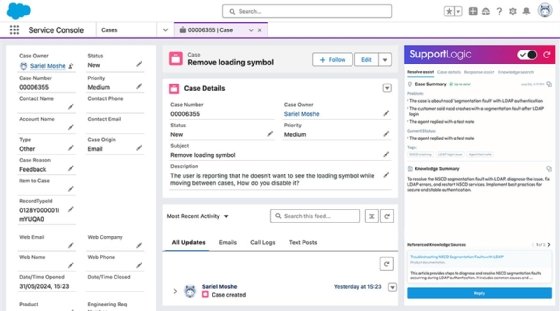
Getty Images/iStockphoto
SupportLogic acquires xFind for customer service experience AI
Startup SupportLogic buys xFind to add generative AI to its service analytics platform, and in the process takes on much larger competition such as Qualtrics, Medallia and Verint.
Customer service experience startup SupportLogic today closed the acquisition of RAG framework vendor xFind to add deeper search and generative AI features to its platform.
SupportLogic integrated xFind's technology into its SX management platform to speed up its ability to surface answers. Financial terms of the acquisition were not disclosed.
SupportLogic, which collects voice of the customer data and also performs customer analytics in the course of service calls, can be used as a standalone platform and also as a plug-in to popular service ticketing systems such as Salesforce, ServiceNow and Zendesk. Data management provider Informatica uses SupportLogic in its voice of the customer platform.
XFind's retrieval-augmented generation (RAG) architecture allows customers' proprietary service data to be used alongside large language models (LLMs). It has features for customer service organizations that typically need to locate updated knowledge from platforms such as Salesforce CRM, Jira for engineering, Confluence for documentation and Slack collaboration to solve problems during customer interactions.
Adding xFind can potentially improve SupportLogic's utility for Informatica and more intuitively surface the right information among its expansive knowledgebase, said Geetha Gopalakrishnan, senior vice president of customer support at Informatica.
"We don't want people to be looking [for service answers]," she said. "Today, unless they have the right keywords, they don't find the right information. But if [xFind's] capability is all folded in, Informatica has a wealth of knowledge -- and on top of that, we have the telemetry from the back end as well. I think it will be a very good addition."

GenAI can elevate service automation
While some enterprises have been slow to adopt generative AI, service has emerged as an area of need, and vendors such as Salesforce and Zendesk are engaged in an arms race to be first-to-market with new tools. When data models are properly trained, generative AI has the potential to locate and summarize the data needed to solve customer problems more efficiently than AI predecessors.
Informatica is one such example. Its customer support enterprise technology stack aims to decrease customer service escalations to its contact center by giving its data cloud customers automated answers. Typical escalations come when Informatica users have issues migrating from on-premises to cloud versions of Informatica's data management products, Gopalakrishnan said.
Informatica's long-range plan involves building customer service knowledge directly into its cloud applications and services. The idea is to anticipate customer questions and answer them before they become a service interaction. A combination of generative AI tools including their own, SupportLogic's and from other vendors will help Informatica accomplish this.
"I want my team to only comprise highly skilled individuals who only deal with very complicated problems," Gopalakrishnan said. "That needs a multitude of things to happen, but I'm thinking maybe in five to 10 years it might become something that generative AI can produce. It is not going to replace humans -- it is going to make the humans more efficient, more productive and highly skilled."
Startups like SupportLogic hope to compete with long-established customer analytics and voice of the customer vendors such as Qualtrics and Medallia by moving faster. These startups also give Salesforce and Zendesk users quick access to their technologies with plug-in integrations.
Generative AI will give users the ability to analyze every customer interaction and extract positive and negative signals about how well the service organization is doing. This represents a leap forward compared with what many organizations do now: analyzing the small minority that fills out surveys, random analyses of tickets or cherry-picked difficult cases.
More than that, though, generative AI will help agents -- human and digital -- find the right information faster. Over the last 15 years, most customer service organizations spent their efforts building knowledge-centered service (KCS) operations, said Judith Platz, SupportLogic chief customer officer and former Salesforce support senior vice president.
This approach involves aggregating enterprise knowledge into a service-accessible repository. First, this operation entailed getting memorized knowledge out of the most experienced support agents' heads. Then it became an effort to acquire technical knowledge from subject matter experts in the company, such as sales engineers, by commissioning technical articles they would write -- and which would be subject to long technical reviews.
Generative AI can instantly create articles based on service ticket data. It then can find it instantly, as well.
"We created all this content, we had all these programs, we could say that X number of people write, review and publish all of the KCS things," Platz said. "And yet, we didn't make it that much easier to surface that information sitting in the largest repository we have.
"But if you can actually take me to a case that somebody on the other side of the world just worked on -- and closed -- and it's the exact same problem? We should have been doing this decades ago. It's almost too easy of a problem to have solved."
Don Fluckinger is a senior news writer for TechTarget Editorial. He covers customer experience, digital experience management and end-user computing. Got a tip? Email him.







